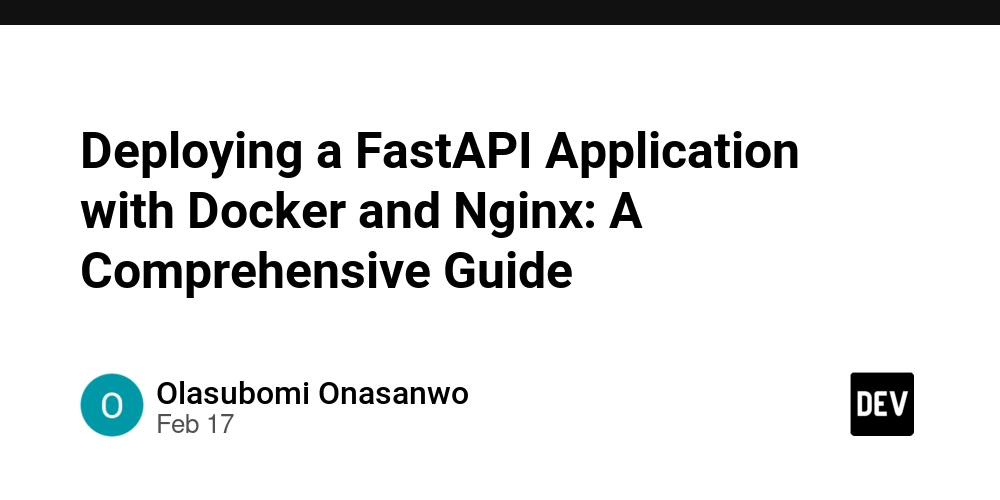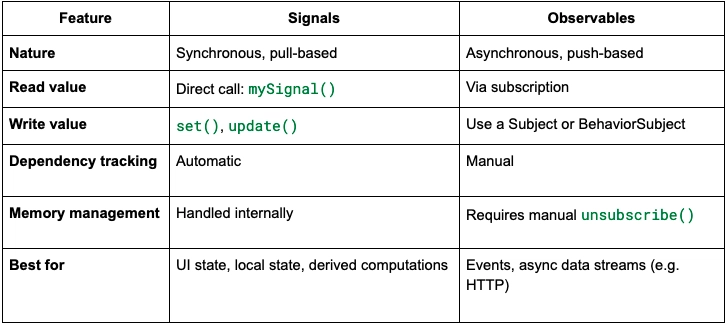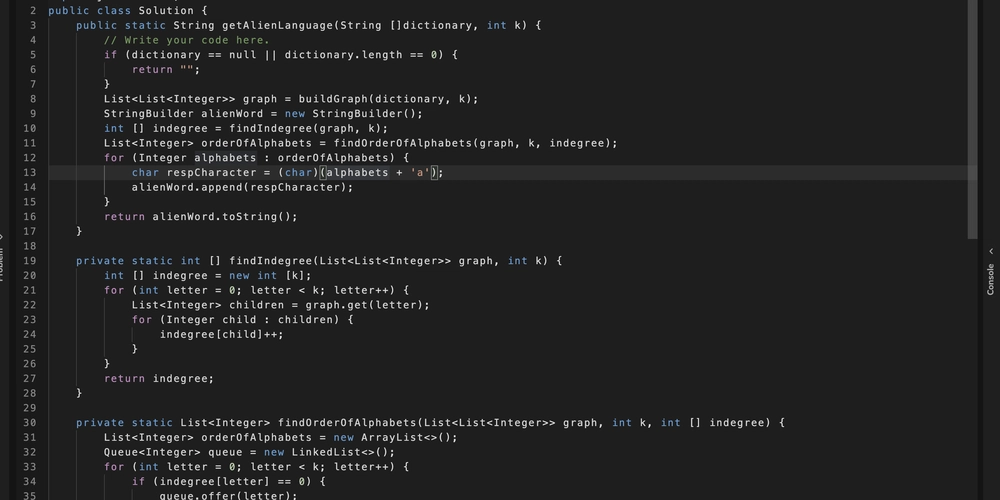Deploying a FastAPI Application with Docker and Nginx: A Comprehensive Guide
This project demonstrates the deployment of a modern web API using FastAPI, a high-performance Python web framework, integrated with industry-standard DevOps practices. The core application is a book management system that allows users to perform CRUD (Create, Read, Update, Delete) operations on a collection of books, with each book containing details such as title, author, publication year, and genre. The system maintains data consistency through a structured schema and provides RESTful endpoints for interacting with the book inventory. The deployment architecture showcases the implementation of containerization using Docker and reverse proxy configuration using Nginx, essential components in modern web application deployment. The solution utilizes Docker Compose for container orchestration, managing two main services: the FastAPI application and an Nginx reverse proxy. This setup ensures proper request routing, header management, and service isolation, while maintaining high availability and scalability. The deployment process includes comprehensive configuration of server headers, network settings, and proper integration between the FastAPI service and Nginx proxy, demonstrating a production-ready implementation that follows DevOps best practices. Prerequisites AWS EC2 instance (Ubuntu 22.04) Basic knowledge of Python, Docker, and Nginx Domain name (optional) System Architecture Our deployment stack consists of: FastAPI application serving the API Nginx acting as a reverse proxy Docker containers for isolation and portability Docker Compose for service orchestration Step 1: Server Setup 1.1 Launch EC2 Instance Launch Ubuntu 22.04 EC2 instance Configure security groups: HTTP (80) : 0.0.0.0/0 HTTPS (443) : 0.0.0.0/0 SSH (22) : Your IP 1.2 Connect to Server ssh -i your-key.pem ubuntu@your-ec2-public-ip 1.3 Update System sudo apt update sudo apt upgrade -y Step 2: Installing Required Software 2.1 Install Python and Virtual Environment Install Python 3 sudo apt install python3 python3-pip -y Install venv sudo apt install python3.10-venv -y Create virtual environment python3 -m venv venv Activate virtual environment source venv/bin/activate 2.2 Install Docker and Docker Compose Install Docker sudo apt install docker.io -y Install Docker Compose sudo apt install docker-compose -y Add user to docker group sudo usermod -aG docker $USER Verify installations docker --version docker-compose --version Step 3: Application Setup 3.1 Clone and Configure Project Clone project repository git clone your-repository-url cd fastapi-book-project Create project structure mkdir -p api/db api/routes 3.2 Create Application Files main.py from fastapi import FastAPI from fastapi.middleware.cors import CORSMiddleware from api.router import router app = FastAPI( title="Book Management API", description="A simple API for managing books", version="1.0.0" ) app.add_middleware( CORSMiddleware, allow_origins=[""], allow_credentials=True, allow_methods=[""], allow_headers=["*"], ) app.include_router(router) api/router.py from fastapi import APIRouter from api.routes import books router = APIRouter() router.include_router( books.router, prefix="/api/v1/books", tags=["books"] ) Step 4: Docker Configuration 4.1 Create Dockerfile FROM python:3.12-slim WORKDIR /app COPY requirements.txt . RUN pip install --no-cache-dir -r requirements.txt COPY . . EXPOSE 8000 CMD ["uvicorn", "main:app", "--host", "0.0.0.0", "--port", "8000"] 4.2 Create docker-compose.yml version: '3.8' services: fastapi-app: build: . container_name: fastapi_app restart: always networks: - app_network nginx: image: nginx:alpine container_name: fastapi_nginx ports: - "80:80" volumes: - ./nginx.conf:/etc/nginx/conf.d/default.conf depends_on: - fastapi-app networks: - app_network networks: app_network: driver: bridge Step 5: Nginx Configuration 5.1 Create nginx.conf server { listen 80; server_name your-domain; proxy_hide_header Server; add_header Server nginx always; location /api/v1/books { proxy_pass http://fastapi-app:8000/api/v1/books/; proxy_set_header Host $host; proxy_set_header X-Real-IP $remote_addr; proxy_set_header X-Forwarded-For $proxy_add_x_forwarded_for; proxy_set_header X-Forwarded-Proto $scheme; } location / { proxy_pass http://fastapi-app:8000; proxy_set_header Host $host; proxy_set_header X-Real-IP $remote_addr; proxy_set_header X-Forwarded-For $proxy_add_x_forwarded_for; proxy_set_header X-Forwarded-Proto $scheme; } } Step 6: Deployment 6.1 Build and Start Services Build images docker-compose build Start services docker-compose up -d Verify services docker-compose ps 6.2 Check Logs Check FastAPI

This project demonstrates the deployment of a modern web API using FastAPI, a high-performance Python web framework, integrated with industry-standard DevOps practices. The core application is a book management system that allows users to perform CRUD (Create, Read, Update, Delete) operations on a collection of books, with each book containing details such as title, author, publication year, and genre. The system maintains data consistency through a structured schema and provides RESTful endpoints for interacting with the book inventory.
The deployment architecture showcases the implementation of containerization using Docker and reverse proxy configuration using Nginx, essential components in modern web application deployment. The solution utilizes Docker Compose for container orchestration, managing two main services: the FastAPI application and an Nginx reverse proxy. This setup ensures proper request routing, header management, and service isolation, while maintaining high availability and scalability. The deployment process includes comprehensive configuration of server headers, network settings, and proper integration between the FastAPI service and Nginx proxy, demonstrating a production-ready implementation that follows DevOps best practices.
Prerequisites
AWS EC2 instance (Ubuntu 22.04)
Basic knowledge of Python, Docker, and Nginx
Domain name (optional)
System Architecture
Our deployment stack consists of:
FastAPI application serving the API
Nginx acting as a reverse proxy
Docker containers for isolation and portability
Docker Compose for service orchestration
Step 1: Server Setup
1.1 Launch EC2 Instance
Launch Ubuntu 22.04 EC2 instance
Configure security groups:
HTTP (80) : 0.0.0.0/0
HTTPS (443) : 0.0.0.0/0
SSH (22) : Your IP
1.2 Connect to Server
ssh -i your-key.pem ubuntu@your-ec2-public-ip
1.3 Update System
sudo apt update
sudo apt upgrade -y
Step 2: Installing Required Software
2.1 Install Python and Virtual Environment
Install Python 3
sudo apt install python3 python3-pip -y
Install venv
sudo apt install python3.10-venv -y
Create virtual environment
python3 -m venv venv
Activate virtual environment
source venv/bin/activate
2.2 Install Docker and Docker Compose
Install Docker
sudo apt install docker.io -y
Install Docker Compose
sudo apt install docker-compose -y
Add user to docker group
sudo usermod -aG docker $USER
Verify installations
docker --version
docker-compose --version
Step 3: Application Setup
3.1 Clone and Configure Project
Clone project repository
git clone your-repository-url
cd fastapi-book-project
Create project structure
mkdir -p api/db api/routes
3.2 Create Application Files
main.py
from fastapi import FastAPI
from fastapi.middleware.cors import CORSMiddleware
from api.router import router
app = FastAPI(
title="Book Management API",
description="A simple API for managing books",
version="1.0.0"
)
app.add_middleware(
CORSMiddleware,
allow_origins=[""],
allow_credentials=True,
allow_methods=[""],
allow_headers=["*"],
)
app.include_router(router)
api/router.py
from fastapi import APIRouter
from api.routes import books
router = APIRouter()
router.include_router(
books.router,
prefix="/api/v1/books",
tags=["books"]
)
Step 4: Docker Configuration
4.1 Create Dockerfile
FROM python:3.12-slim
WORKDIR /app
COPY requirements.txt .
RUN pip install --no-cache-dir -r requirements.txt
COPY . .
EXPOSE 8000
CMD ["uvicorn", "main:app", "--host", "0.0.0.0", "--port", "8000"]
4.2 Create docker-compose.yml
version: '3.8'
services:
fastapi-app:
build: .
container_name: fastapi_app
restart: always
networks:
- app_network
nginx:
image: nginx:alpine
container_name: fastapi_nginx
ports:
- "80:80"
volumes:
- ./nginx.conf:/etc/nginx/conf.d/default.conf
depends_on:
- fastapi-app
networks:
- app_network
networks:
app_network:
driver: bridge
Step 5: Nginx Configuration
5.1 Create nginx.conf
server {
listen 80;
server_name your-domain;
proxy_hide_header Server;
add_header Server nginx always;
location /api/v1/books {
proxy_pass http://fastapi-app:8000/api/v1/books/;
proxy_set_header Host $host;
proxy_set_header X-Real-IP $remote_addr;
proxy_set_header X-Forwarded-For $proxy_add_x_forwarded_for;
proxy_set_header X-Forwarded-Proto $scheme;
}
location / {
proxy_pass http://fastapi-app:8000;
proxy_set_header Host $host;
proxy_set_header X-Real-IP $remote_addr;
proxy_set_header X-Forwarded-For $proxy_add_x_forwarded_for;
proxy_set_header X-Forwarded-Proto $scheme;
}
}
Step 6: Deployment
6.1 Build and Start Services
Build images
docker-compose build
Start services
docker-compose up -d
Verify services
docker-compose ps
6.2 Check Logs
Check FastAPI logs
docker-compose logs fastapi-app
Check Nginx logs
docker-compose logs nginx
Step 7: Testing
7.1 API Endpoint Testing
Test list endpoint
curl http://your-domain/api/v1/books/
Test single book endpoint
curl http://your-domain/api/v1/books/1
Test server headers
curl -I http://your-domain/api/v1/books/
7.2 Browser Testing
Navigate to http://your-domain/docs
Test endpoints through Swagger UI
Step 8: Maintenance and Monitoring
8.1 View Container Stats
docker stats
8.2 Monitor Logs
docker-compose logs -f
8.3 Backup Configuration
Backup important files
tar -czf backup.tar.gz docker-compose.yml nginx.conf Dockerfile
Best Practices
Security
Keep Docker and system packages updated
Use specific container versions
Implement proper firewall rules
Performance
Enable Nginx caching when appropriate
Monitor resource usage
Implement rate limiting
Maintenance
Regular backups
Log rotation
Health checks
Conclusion
This deployment architecture provides a robust, scalable solution for hosting FastAPI applications. The combination of Docker containers and Nginx reverse proxy ensures:
Isolated application environment
Proper request handling
Scalability options
Easy maintenance
Regular monitoring and maintenance will ensure optimal performance and reliability of your deployed application.









































































































































































![[The AI Show Episode 142]: ChatGPT’s New Image Generator, Studio Ghibli Craze and Backlash, Gemini 2.5, OpenAI Academy, 4o Updates, Vibe Marketing & xAI Acquires X](https://www.marketingaiinstitute.com/hubfs/ep%20142%20cover.png)


























































































































![[FREE EBOOKS] The Kubernetes Bible, The Ultimate Linux Shell Scripting Guide & Four More Best Selling Titles](https://www.javacodegeeks.com/wp-content/uploads/2012/12/jcg-logo.jpg)



![From drop-out to software architect with Jason Lengstorf [Podcast #167]](https://cdn.hashnode.com/res/hashnode/image/upload/v1743796461357/f3d19cd7-e6f5-4d7c-8bfc-eb974bc8da68.png?#)







































































































.png?#)




.jpg?#)


















 (1).webp?#)













_Christophe_Coat_Alamy.jpg?#)







































































































![Rapidus in Talks With Apple as It Accelerates Toward 2nm Chip Production [Report]](https://www.iclarified.com/images/news/96937/96937/96937-640.jpg)









































































































































